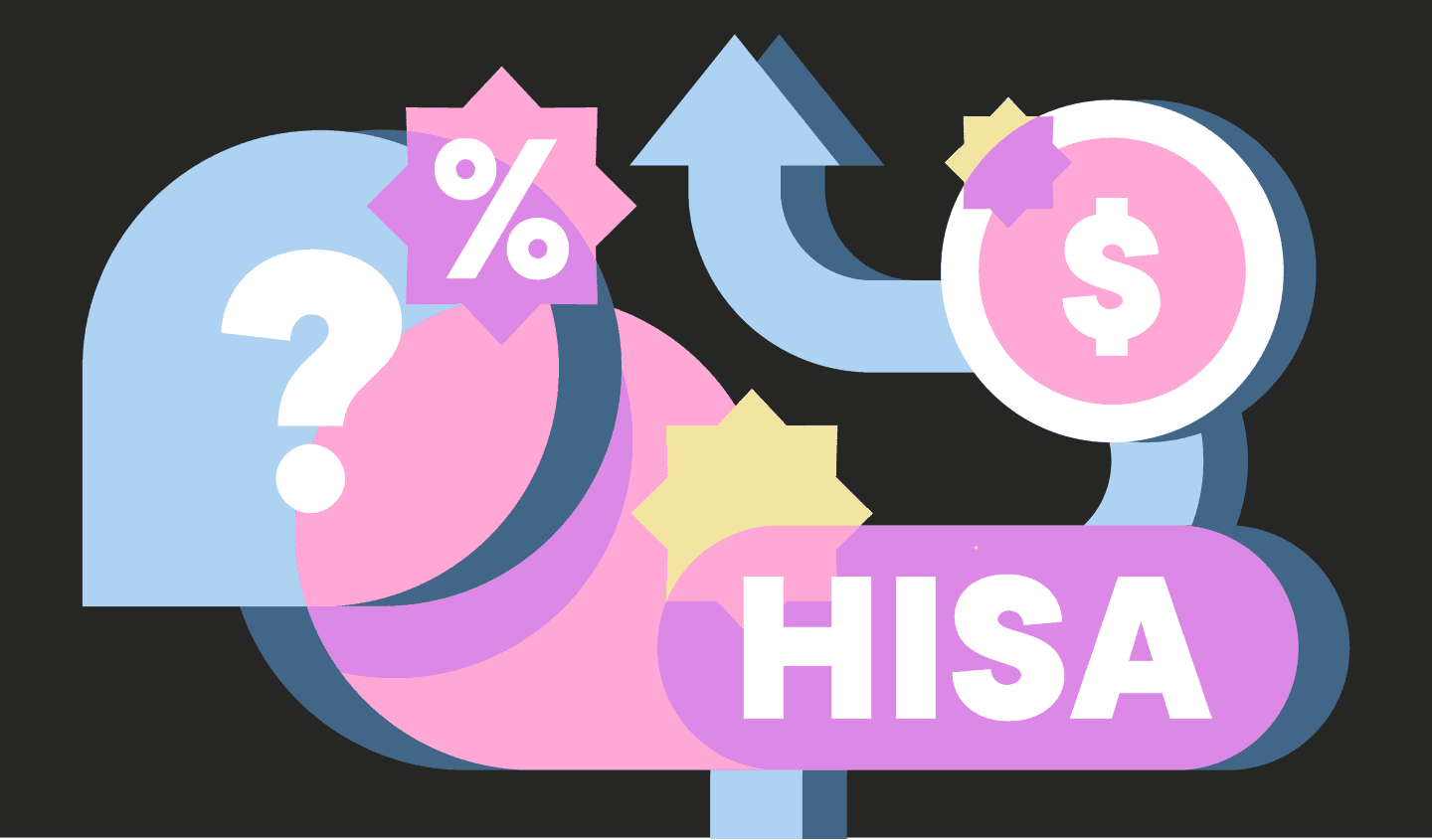Should I open a high-interest savings account?
A high-interest savings account (HISA) is a popular option for Canadians to keep short-term funds. Whether you have an emergency fund or are saving money for a big purchase, such as a new car, a HISA is a great tool. Your cash is safe, accessible, and earns interest.
Amidst the rising cost of goods and services, you’re probably wondering how to optimize your finances. In addition to paying bills and ensuring you cover the necessities, it’s also essential to save and invest for the future.
With a high-interest savings account, you get higher interest rates compared to a standard savings account, without the limitations and fees of many other financial products, such as tax-free savings accounts (TFSAs) and guaranteed investment certificates (GICs).
If you want to optimize your short-term savings without the risk of investing, consider a high-interest savings account. You’ll earn compound interest, which grows your money quicker and helps you reach your savings goals faster.
Before opening your HISA, consider how it fits into your overall financial picture. Read on to learn more about what you should consider when opening a high-interest savings account and the benefits it can provide.
Benefits of a high-interest savings account
High-interest savings accounts have many benefits for short-term cash savings. They are one of the smartest places to keep your cash savings. Here are some specific benefits you should consider about HISAs.
Higher interest rates: High-interest savings accounts offer higher rates than standard savings accounts. Your funds outpace the return you would get from keeping money in a traditional savings account.
Earn compound interest: You earn interest on both the principal balance and the accumulated interest earnings from previous periods. The Neo High-Interest Savings account has a 4.00% interest rate¹.
Accessibility: You can access your funds instantly, allowing the flexibility to deposit and withdraw money whenever you want. Neo doesn’t charge any fees for transferring money between your Neo High-Interest Savings accounts and other Neo accounts².
Deposit insurance: CDIC covers eligible deposits up to a maximum of $100,000 per insured category, per depositor. Deposits in Neo High-Interest Savings accounts are eligible for this protection³.
No monthly fees: The Neo High-Interest Savings account has no monthly fees and no minimum balance required.
Open multiple accounts: You can open multiple High-Interest Savings accounts and personalize them to specific savings goals.
HISAs are a great choice to add to your financial portfolio. You get higher compound interest earnings than standard savings accounts and guaranteed risk-free earnings compared to investment accounts. You don’t have to lock in your money like with GICs, or have contribution limits like TFSAs and registered retirement savings plans (RRSPs).
Understanding your financial goals with a HISA
Before opening any account, understand if it fits within your overall financial outlook. Each banking, savings, and investment account has specific purposes and benefits that you can maximize to get the most earnings.
Understanding your financial goals ensures you know what you want to achieve with your HISA and are comfortable with your choice. Here are some considerations when assessing your financial goals.
Short-term financial goals
Short-term financial goals refer to anything within a five-year window. Examples include paying for tuition, buying a car, going on vacation, or buying an expensive item.
If you have a shorter time frame for growing and investing your money, you may want security rather than growth potential. If you need to access your funds sooner, you probably won’t have a high-risk tolerance.
You can create a detailed financial plan for what you want to achieve financially within five years. While things may happen that change your life plans, there’s a lower chance of something throwing you off in the short term compared to the long term.
Long-term financial goals
Long-term financial goals include anything you want to achieve in more than five years. For most people, long-term goals may include saving for retirement, buying a house, leaving an inheritance, or paying off a mortgage. In most cases, you don’t touch money set aside for long-term goals.
Many people opt for an investing account for long-term financial goals, as you have a longer time horizon to grow your money. You can chase higher gains and make up for slower performance as you monitor your account over several years. If you are unhappy with your investment portfolio, there’s usually time to make adjustments.
Planning for long-term goals can be tricky because there are a lot of unknown factors. A lot can happen in 5, 10, or 15 years from now. You could have a career change, win the lottery, have unexpected medical expenses, or need to make significant home renovations. Those variables make it significantly harder to create a consistent savings plan.
While HISAs may not be the right choice for long-term financial goals, they can help with unexpected expenses you may encounter along the way. Many people like to keep an emergency fund in a high-interest savings account. You get more peace of mind knowing there are funds to cushion any unknown variables that impact your financial plan.
When should I consider opening a high-interest savings account?
Think about when you need the money and what you’re trying to accomplish. If you want a lot of growth and aren’t in a hurry to access your money, you may want to consider an investment account.
However, if you need to access your money within the next few years, you may want something with less or no risk. This is where a high-interest savings account comes into play.
Assessing your current financial situation
Many aspects of your financial situation influence how you spend, save, and invest your money, such as your income, expenses, savings, debt, investments, and risk tolerance. The individual pieces are part of the puzzle of what you can afford now and in the future.
Before opening a high-interest savings account or any other type of savings or investment account, you should assess your current financial situation to determine if you have the means to use them. After all, you can only save and invest if you have extra cash on hand after paying your monthly expenses.
Let’s dive into each component of your financial situation to evaluate if a high-interest savings account is the right choice for you.
Savings
Savings refers to any money you intend to put away for the future. You can save money by intentionally putting it aside, like in a savings or investment account, or by reducing your expenses, like spending less on takeout. Putting money into a high-interest savings account is a great choice to meet various savings goals you want to reach–like building an emergency fund.
Investments
Although some products may guarantee a return on investment in the short term, like 2-year GICs, investments typically need more time to grow. Consider investing your money somewhere better suited for long-term growth, such as a professionally managed investment account.
Debt
Debt is money that you borrow and have to pay back, such as a credit card balance, student loans, mortgage, or auto lease. Have a debt repayment plan and set aside money regularly to cover your payments. It prevents you from incurring potential penalty fees.
For example, consider putting the money set aside for debt in a Neo High-Interest Savings account. With multiple accounts customized to different goals as your needs evolve, you can dedicate an account to each of the debts you have. It ensures you have enough funds to meet the repayment plans.
Expenses
An expense is the outflow of money and can fall into several categories. You should track your expenses to understand how much you spend relative to what you earn, and where your money goes. There are two types of expenses–fixed and flexible. Fixed expenses stay the same each month, such as rent, phone plans, and insurance. Flexible expenses vary, such as utility bills, groceries, and gas.
Most people use an everyday chequing account for paying bills. With a high-interest savings account, you can earn interest on your money before transferring it to your everyday account to pay for your expenses.
Risk tolerance
Risk tolerance is an important factor in building a financial plan. There is always risk with saving, investing, and spending. You could lose money in the stock market, the investment provider could fail (though this is rare in Canada), or you could rack up debt and end up paying a lot of interest.
If you have a low-risk tolerance and don’t want to hold a lot of debt, consider keeping enough money in a HISA or chequing account to pay off your debts immediately. If you have a higher risk tolerance and are comfortable with fluctuations, you can diversify your investment portfolio and allocate some of your money to stocks, mutual funds, and exchange-traded funds (ETFs).
Whatever the case may be, combine your risk tolerance, time horizon, and goals to create a well-balanced and diversified portfolio.
Other factors to consider before opening a high-interest savings account
Interest rates
It’s important to review interest rates regularly to understand how much interest you will earn on your savings.
Some institutions may offer promotional rates on standard savings accounts, which gives you a temporary high interest rate for a specific period. However, the post promotional rate is typically low. High-interest savings accounts have consistently higher interest rates.
Fees and minimum balances
Some financial service providers may not charge monthly fees for standard and high-interest savings accounts but might have minimum balance requirements to earn a higher interest rate. For example, an institution may offer a specific interest for deposits up to $1,000, and a higher rate on balances over $1,000. Financial service providers may also charge fees for transactions using your savings account or transferring money to another provider.
Inflation
Inflation decreases the value and spending power of your money over time. The compound interest earned from a high-interest savings account can help counter inflation by allowing your money to grow over time.
Ready to get started? Open a Neo High-Interest Savings account today
Neo has one of the highest interest rates in Canada⁴, earning 4.00% interest¹ on every dollar for new and existing customers. The Neo High-Interest Savings account is a great tool to help achieve your short-term financial goals and support your long-term ones.
Canadians 13 and older⁵ can open a Neo High-Interest Savings account with no monthly fees or minimum deposit requirements. It’s never too early to start being financially responsible, and our HISA can help your child learn important financial literacy skills.
Open a Neo High-Interest Savings account today in as little as three minutes. If you're between the ages of 13-18, check out our high-interest savings account for youth!
<br/><br/>
¹ Interest is calculated daily on the total closing balance and paid monthly. Rates are per annum and subject to change without notice.
² Limitations apply to Quebec residents.
³ The Neo High-Interest Savings account is provided by Peoples Bank of Canada, a CDIC member institution, and is eligible for CDIC deposit protection. Deposits held in Neo High-Interest Savings accounts are combined with eligible deposits held at Peoples Bank of Canada, for up to $100,000 of deposit protection, per category, per depositor. For more information about CDIC deposit insurance, please consult CDIC’s website cdic.ca.
⁴ Based on research of high-interest savings accounts, comparing and limited to: BMO, CIBC, Scotiabank, TD Bank, RBC, Simplii Financial, Desjardins, and Tangerine. Research conducted by Neo Financial and based on data taken from public websites on November 28, 2023. Research excludes welcome offers.
⁵ Account only available to Canadian residents. You must be at least 13 years of age if you reside outside of Quebec; if you reside in Quebec you must be at least 14 years of age.

-noZ7EWjRU9dKiBNDc0ZBel0LonqVUs.png&w=1920&q=75)

